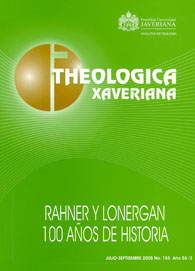Abstract
La última concepción de Lonergan de la filosofía como un metamétodo, sin ser toda la filosofía, es una exigencia de autocomprensión histórica actual de sí misma y del ser humano en general. Pretende tematizar la normatividad intrínseca que la constituye: la autenticidad. Supera dicotomías filosóficas sin sacrificar un pluralismo razonable y atiende a los desarrollos de los sistemas en movimiento sin convertirse ella misma en otro sistema que los encierre. Antes bien, es emancipadora, crítica, fundacional, integradora y dinamizadora de éstos, porque va más allá de sus analogías con la lógica, los comportamientos lingüísticos regulados, el naturalismo científico, las artes o el frenesí de la vida cotidiana.
CROWE, F., The Lonergan Enterprise. Cowley Pb., Mass., 1980, pp. 1-41.
JACOB, A., (Éditeur générale)Encyclopédie Philosophique Universelle, 1992.
LAMB, M., History, Method, and Theology: A Dialectical Comparison of Wilhelm Dilthey’s Critique of Historical Reason and B. Lonergan’s Meta-
Methodology, Scholar Press, Missoula, 1977.
LONERGAN, B.J.F. (1935), “Pantôn Anakephalaiôsis. A Theory of Human Solidarity” (“De la recapitulación de todas las cosas en Dios”), en Method: Journal of Lonergan Studies 9: 2, 1991, pp. 134-172.
LONERGAN, B.J.F. (1957), Insight. A Study of Human Understanding, Longmans, Green & Co., London, y Philosophical Library, New York, Recientemente en CROWE, F.E. Y DORAN, R.M. (editores), Collected Works of B. Lonergan, Vol. 3, U.T.P., Toronto, 1992; y en Insight. Estudio sobre la comprensión humana. (traducido por F. Quijano), Sígueme, Salamanca, y UIA, México, 1999.
LONERGAN, B.J.F., Method in Theology, Herder and Herder, New York, 1972. Traducido por REMOLINA, GERARDO, Método en teología, Sígueme, Salamanca, 1988.
LONERGAN, B.J.F., Philosophy of God and Theology, Darton, Longman & Todd, London, 1973.
This journal is registered under a Creative Commons Attribution 4.0 International Public License. Thus, this work may be reproduced, distributed, and publicly shared in digital format, as long as the names of the authors and Pontificia Universidad Javeriana are acknowledged. Others are allowed to quote, adapt, transform, auto-archive, republish, and create based on this material, for any purpose (even commercial ones), provided the authorship is duly acknowledged, a link to the original work is provided, and it is specified if changes have been made. Pontificia Universidad Javeriana does not hold the rights of published works and the authors are solely responsible for the contents of their works; they keep the moral, intellectual, privacy, and publicity rights.
Approving the intervention of the work (review, copy-editing, translation, layout) and the following outreach, are granted through an use license and not through an assignment of rights. This means the journal and Pontificia Universidad Javeriana cannot be held responsible for any ethical malpractice by the authors. As a consequence of the protection granted by the use license, the journal is not required to publish recantations or modify information already published, unless the errata stems from the editorial management process. Publishing contents in this journal does not generate royalties for contributors.


